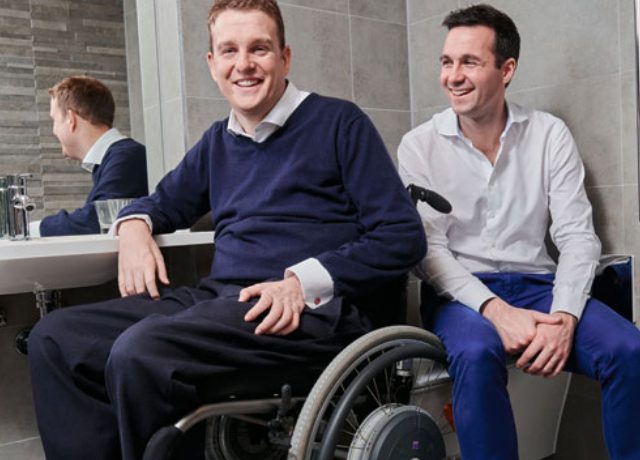The Old Palace Lodge hosted MotionSpot for an accessible stay, for a feature in the Sunday Times.
A helping hand that benefits everyone
Businesses are embracing the idea that if you make services better for the millions of people in the UK who live with some form of disability, you can improve things for everybody
When James Taylor dived into the sea in Portugal in 2005 and broke his neck, it was the start of a very different way of life. After eight tough months of rehabilitation at Stoke Mandeville Hospital, he finally returned home, where he faced the next challenge: he was now living in a world where nothing was designed with him in mind and even the most basic tasks could present a hurdle.
Taylor noticed that, when facilities were designed for disabled people, there was no thought of stylish and comfortable living. “Anyone would want their home to have a sense of choice and style,” he says. “But mine was dressed up like a hospital – white plastic grab rails, grey padded shower seats and vinyl flooring. Every morning I would wake up and be reminded of my condition.”
A conversation about these frustrations with schoolfriend Ed Warner led the pair to launch Motionspot, a business that aims to solve such “design crimes” in adapted bathrooms, by catering to customers’ aesthetic tastes as well as their physical needs. “UK manufacturers said we were mad for thinking people would pay for accessible solutions that were also stylish,” says Warner. “But we saw a real opportunity to create a compelling business.”
Ask Warner about his business journey today and he describes it as “enlightening”. Indeed, Motionspot had tapped into something many businesses are still catching up on: there are more than 11 million people living with disabilities in the UK, according to the government. It estimates their spending power – nicknamed the “purple pound” – at a hefty £249 billion a year.
Now, it appears businesses are finally realising the competitive advantage of catering to this significant consumer segment. As well as adapting more than 300 bathrooms a year in people’s homes, Motionspot has worked with Bespoke Hotels to design and install beautifully accessible bathrooms and bedrooms across their 200-strong hotel estate.
It is also working with the Manchester-based serviced apartment company Staying Cool, to install innovative technology such as removable grab rails and shower seats, giving the flexibility to install supports for guests when required.
Warner says: “We are seeing a surge in enquiries from hotels that see the benefit of rooms that can appeal to all guests and ultimately improve revenue.”
Catering for accessibility tends to have the knock-on effect of improving things for all consumers – and this in turn can create commercial benefits.
If you get things right for disabled people, you get things right for everybody,” says Diane Lightfoot, CEO of the Business Disability Forum. For example, installing ramps at airports for step-free access to aircraft turned out to be popular with all passengers with wheelie cases. And railway stations with lifts to the platforms also reported fewer accidents. In other words, inclusivity makes commercial sense.
Lightfoot says that businesses have started to understand that disabilities extend far beyond the physical space. Only a small percentage of those with disabilities are wheelchair users and, she says, the vast majority of disabilities aren’t even visible to most people. So there is plenty that can be done to make services accessible, even beyond physical refits. Some cinemas, for instance, now have autism-friendly screenings and some airports offer fast-track boarding for autistic people.
Working with a business partner that shares the same values of inclusivity is important to Motionspot, and the company has partnered closely with Barclays for the past 18 months. Warner has even spoken at the bank’s small business events. He says the secret to accessibility isn’t knowing how to solve every problem, nor being an expert on people’s needs – it’s just about having the confidence to talk to disabled consumers and employees and ask how you can help.
“The key is getting the environment right so it doesn’t disadvantage people,” he says. “Most issues can be remedied if people are willing to listen. And people are quick to realise that creating access for all does, in fact, improve things not just for people living with disabilities, but for their friends and families too and, ultimately, for everyone.”
Read the full article here: https://www.thetimes.co.uk/static/connected-families/the-benefits-to-business-of-embracing-disability/

